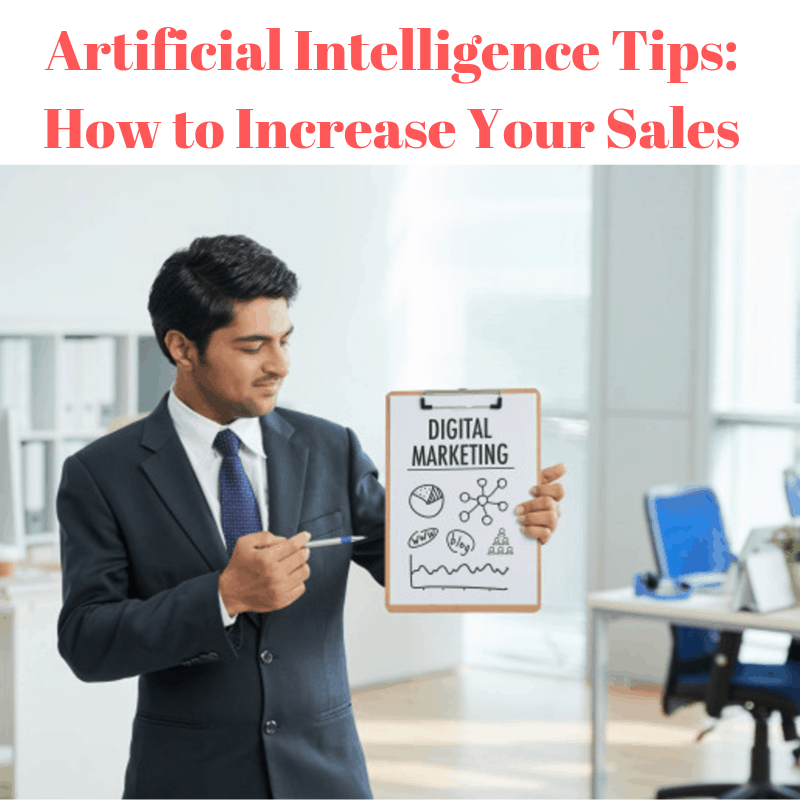![Artificial Intelligence: How to Improve Your Marketing Automation Strategy [Infographic]](https://blog.red-website-design.co.uk/wp-content/uploads/2019/10/How-to-Use-Artificial-Intelligence-to-Elevate-Your-Marketing-Automation-Strategy.jpg)
Tag Archives: artificial
How Artificial Intelligence is Changing The Design and The Web [Infographic]
Artificial Intelligence Tips: How to Increase Your Sales

Direct marketing campaigns are truly effective when you precisely target customers to buy from you. This is done by Profiling and Modeling prospects and clients. The key point is the artificial intelligence technology (AI).
Mass mailings campaigns are replaced with targeted campaigns that market to specific customers using A.I. technology. Today, it’s possible to collect an enormous amount of information about customers, and use it in “profiling” and “modeling”.
Both of these techniques are ways of applying external data to possible clients. They can be used to prospect for business or to existing customers for your mailing. The goal (success) is to predict behavior based on what you know about your customers.
These two methods are not exclusive, and marketers often use them together. The difference is that profiling data is overlaid against an existing client database, and has a long life span. It can be used for several mailings, and in contrast, modeling is used to sharpen the focus of a specific mailing.
In profiling start with the premise that you don’t want to deal with a customer segment, but rather an individual customer. Break up your client segment into clients who share similar tastes and buying habits. Then use demographic and behavioral information to create a user profile of the customer.
Begin to gather this information from your existing customer database noting such things as frequency of purchases, buying habits, responses to marketing offers, and repeat purchases.
Then start with your perceived prospects using alternate sources of data from purchased sources. Use all this data to break your customers into clusters that share purchasing traits.
What makes profiling/modeling cost-effective.
1. Mailing costs.
2. Artificial Intelligence
3. Higher quality customer data are available.
In the past, direct marketers could mail out 400,000 mailings to find a strong market of 40,000 (1 customer out of 10 mailings was average). The dramatic increase in the cost of paper and postage has made this practice prohibitively expensive.
Computers today are capable of doing millions of computations per second. This makes analyzing mountains of data possible with great results!
Higher quality customer data is more available today, and there are more sources available for obtaining it than ever before.
The result is that you can afford to do a lot of number-crunching before you spend a penny on postage. You can also weed out the useless names and mail only to your most likely prospects.
There are 6 factors to consider when building customer profiles:
• Affinity profiling
Analyzes current buying habits to better match customers to the product. Knowing what kinds of products a particular customer is buying gives you the ability to know what related products your customer will buy pretty easy. (You will become a sales prophet!)
• Demographic and psychographic data
Demographics tell you a client is a 29-year-old, unmarried, male who earns $45,000 and drives a 2-year old sports car. Psychographic data suggests that single young men who buy status-symbol cars are excellent prospects for other highly visible status products.
Combining the two types of data yields a customer profile to someone marketing, the latest iPhone or expensive accessories.
• Lifestyle Coding is used to enhance basic demographic information.
Simply put – people in certain demographic categories will likely have similar hobbies and other interests.
• Mapping is another useful tool in building customer profiles.
Census data, topographic information, geographic coordinates, and zip code+4 postal data can be fed into a computer yielding maps that can be color-coded to certain characteristics of consumers in particular neighborhoods.
• Cluster Coding is a popular means of grouping people by lifestyle characteristics.
It’s like the old names of the neighborhoods. These are known as “clusters”, each given a score according to social position, activities, and aspirations.
• Survey data – can be used to enhance demographics, lifestyle, and other data to build a profile.
This is collected directly from your customers via application forms, surveys, etc. This provides a more personal portrait of the customer than the mere census or demographic data.
P.S.
FREE TRAINING: How to Make Money Online
“How to Earn a 6-Figure Side-Income Online”
Free Training Series Reveals Everything, Step-by-Step http://bit.ly/2XFoEIV
Effective AI Tools for Your Content Strategy: The Benefits of Artificial Intelligence

Content strategy is an art and a science. Successful marketers are great at the art part.
Even if you have a useful strategy, you spend tons of time on keyword research, topic selection, and performance tracking.
Artificial intelligence (AI) can be a major help on the science side of the content strategy equation.
AI-powered tools can help you create content strategies that are actually backed by data, not gut instinct, in a fraction of the time and at scale.
Here are some effective AI tools for your content strategy. Discover the benefits of artificial intelligence for your business.
1. HubSpot
HubSpot’s Content Strategy tool uses machine learning to help marketers discover new content ideas that perform well and validate those content ideas in the most efficient way possible.
The tool offers suggestions about which topic clusters to pursue based on competition and relevance. It also automatically performs competitive research on those topics to make sure they’re worth spending time on.
The result is a machine-assisted content strategy that takes a lot of guesswork of building successful content campaigns.
2. Concured
Concured uses artificial intelligence to show marketers exactly what topics drive engagement and what to write about next.
The result is an AI-powered Content Strategy Platform that automates content audits, topic research, the creation of data-driven content briefs, content promotion, and performance tracking.
3. BrightEdge
BrightEdge is a global leader in SEO and content performance marketing that blends search intent discovery, optimized content creation, and performance measurement into one integrated solution.
The solution uses AI to discover what people are searching for and help you create a content strategy to capture traffic and consumer interest.
4. Crayon
Crayon uses machine learning to give you competitive intelligence on exactly what your competitors are doing online. You’ll be able to see how the main pages of a company’s website change over time, which in turn reveals insights about their content strategy, targeting, and messaging.
This kind of information can be a goldmine of ideas for your content marketing efforts. Just search your top competitors or brands you admire using Crayon and get ready for a torrent of inspiration.
5. MarketMuse
MarketMuse is an AI-driven assistant for building content strategies. The tool will show you exactly what terms you need to target to compete in certain topic categories. It’ll also surface topics you may need to target if you want to own certain topics.
6. Vennli
Vennli is a content intelligence platform that helps marketers be more relevant to customers in messaging, content strategy and marketing communications.
Vennli gives you the power to measure your content metrics over time, so you can track performance at scale. And it offers smart recommendations on how to improve content effectiveness.
Make your research to find more effective AI tools. Then test the tools and choose the best for your business and your content marketing strategy.
P.S.
FREE TRAINING: How to Make Money Online https://www.bestprofitsonline.com/myblog/
“How to Earn a 6-Figure Side-Income Online”
Free Training Series Reveals Everything, Step-by-Step http://bit.ly/2XFoEIV
Social Media Marketing Tips: 7 AI Tools You Need to Know About

Believe it or not, machine learning and artificial intelligence are already at work in your life in a many ways. Machine learning is a subset of artificial intelligence that makes predictions about future outcomes based on historical data and gets smarter as new data becomes available.
In turn, our lives as consumers become more personalized and convenient.
The same thing is happening in marketing.
Artificial intelligence is enabling brands to personalize at scale, transforming the buying process for customers and leaving competitors in the dust.
For social media marketers, this means using AI for informed decisions about what to write in posts, when to publish them, how much to spend sponsoring them, which colors and images to use, and much more.
Here are 7 AI Tools You Need to Know About – How to Improve Your Social Media Marketing Strategy
1. CRM Platforms
The CRM and automation platform you’re using already have AI-powered features built-in or the option to directly integrate AI-powered tools.
Schedule a call with your rep to ask about turning those features on. Some may require an upgraded package, but you’ll never know if you don’t ask.
2. Chatbots
Many companies have chatbots set up on their website as customer service and sales tools. However, just because it has “bot” in the name does not mean it uses artificial intelligence.
Chatbots that aren’t using AI require marketers to do most of the heavy lifting, which can be very overwhelming. Instead, look for chatbots that have AI baked in and can think through all those branching rules for you. This means asking vendors how exactly they’re using AI and machine learning.
3. Yext
When it comes to monitoring reviews online, Yext gets five stars.
Digital knowledge management company Yext processes vast amounts of data (i.e. customer reviews left on Facebook, Google, Yelp, etc.), understands what’s being said within it, and then prioritizes what you should respond to.
This way, you can manage your online reputation through monitoring, analyzing, and responding to customer reviews.
4. rasa.io
Every email you send is a chance to have a one-to-one conversation with your subscribers. Sending personalized emails to millions of contacts is a marketer’s dream.
rasa.io is making that dream a reality with personalized, automated newsletters. Using AI, the system pays attention to what content you engage with the most, then adapts which stories are included in the next email you receive.
Combine that with send-time optimization and now you’re giving your customers exactly what they’re looking for.
5. Pattern89
Social media ad spending shouldn’t be guesswork.
Marketing software Pattern89 uses machine learning to optimize bid, budget, and channel management for your Facebook, Instagram, and Google ads—at scale.
You can think of this tool as your social media assistant. It makes creative and spending recommendations to help you reduce costs and increase revenue.
6. Persado
Social media marketers know the best way to engage with followers is to create authentic relationships. This can be a bit challenging online.
Persado. This marketing language tool uses AI and machine learning to produce language that resonates most with any given audience, segment, or individual.
It creates emotional profiles for every customer segment by analyzing past campaign responses. From there, it can customize content for your audience while incorporating your brand’s unique voice.
7. Phrasee
Another AI-powered language tool social media marketers should use is Phrasee.
This tool optimizes email subject lines to get brands more opens, clicks, and conversions.
Take action now. Start using smart AI tools and create a very effective social media marketing strategy for your business.
P.S.
FREE TRAINING: How to Make Money Online https://www.bestprofitsonline.com/myblog/
“How to Earn a 6-Figure Side-Income Online”
Free Training Series Reveals Everything, Step-by-Step http://bit.ly/2XFoEIV
![How Artificial Intelligence is Changing The Design and The Web [Infographic]](https://blog.red-website-design.co.uk/wp-content/uploads/2019/01/9-Ways-Artificial-Intelligence-Has-Changed-the-Way-We-Design.jpg)